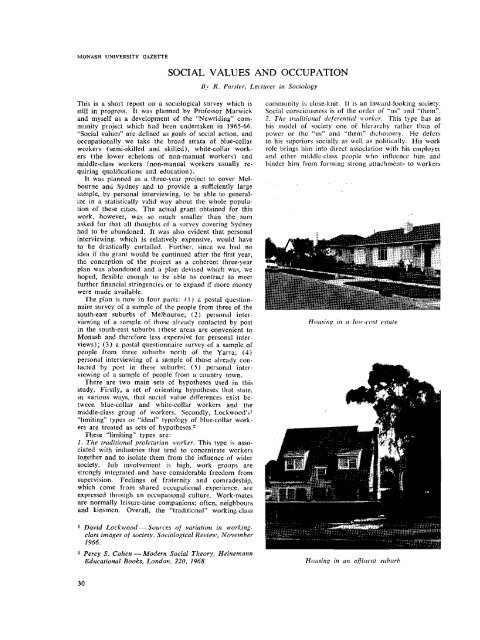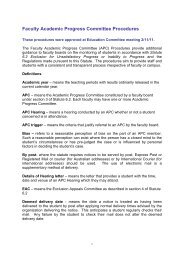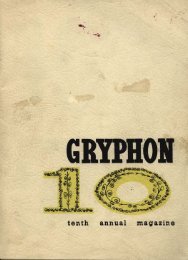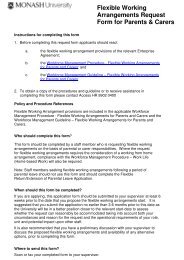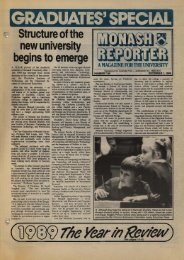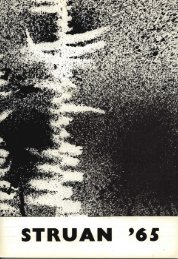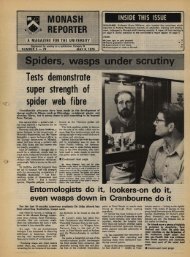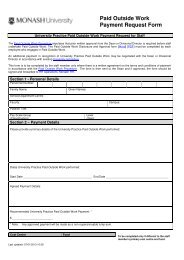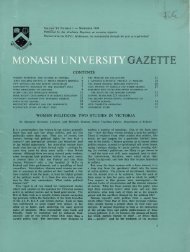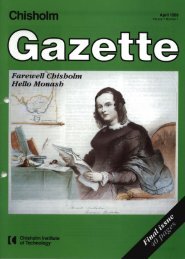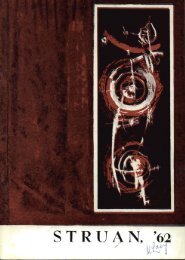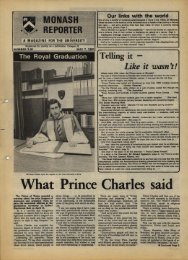MONASH UNIVERSITY <strong>GAZETTE</strong>SOCIAL VALUES AND OCCUPATIONBy R. Parsler, Lecturer in SociologyThis is a short report on a sociological survey which isstill in progress. It was planned by Professor Marwickand myself as a development of the "N ewriding" communityproject which had been undertaken in 1965-66."Social values" are defined as goals of social action, andoccupationally we take the broad strata of blue-collarworkers (semi-skilled and skilled), white-collar workers(the lower echelons of non-manual workers) andmiddle-class workers (non-manual workers usually requiringqualifications and <strong>edu</strong>cation).It was planned as a three-year project to cover Melbourneand Sydney and to provide a sufficiently largesample, by personal interviewing, to be able to generalizein a statistically valid way about the whole populationof these cities. The actual grant obtained for thiswork, however, was so much smaller than the sumasked for that all thoughts of a survey covering Sydneyhad to be abandoned. It was also evident that personalinterviewing, which is relatively expensive, would haveto be drastically curtailed. Further, since we had noidea if the grant would be continued after the first year,the conception of the project as a coherent three-yearplan was abandoned and a plan devised which was, wehoped, flexible enough to be able to contract to meetfurther financial stringencies or to expand if more moneywere made available.The plan is now in four parts: (I) a postal questionnairesurvey of a sample of the people from three of thesouth-east suburbs of Melbourne; (2) personal interviewingof a sample of those already contacted by postin the south-east suburbs tthese areas are convenient to<strong>Monash</strong> and therefore less expensive for personal interviews);(3) a postal questionnaire survey of a sample ofpeople from three suburbs north of the Yarra; (4)personal interviewing of a sample of those already contactedby post in these suburbs; (5) personal interviewingof a sample of people from a country town.There are two main sets of hypotheses used in thisstudy. Firstly, a set of orienting hypotheses that state.in various ways, that social value differences exist betweenblue-collar and white-collar workers and themiddle-class group of workers. Secondly, Lockwood's!"limiting" types or "ideal" typology of blue-collar workersare treated as sets of hypotheses.vThese "limiting" types are:1. The traditional proletarian worker. This type is associatedwith industries that tend to concentrate workerstogether and to isolate them from the influence of widersociety. Job involvement is high, work groups arestrongly integrated and have considerable freedom fromsupervision. Feelings of fraternity and comradeship,which come from shared occupational experience, areexpressed through an occupational culture. Work-matesare normally leisure-time companions; often, neighboursand kim-men. Overall, the "traditional" working-classDavid Lockwood - Sources of variation in workingclassimages of society. Sociological Review, November1966.Percy S. Cohen - Modern Social Theory, HeinemannEducational Books, London, 220, 1968.community is close-knit. It is an inward-looking society.Social consciousness is of the order of "us" nnd "them".2. The traditional deferential worker. This type has ashis model of society one of hierarchy rather than ofpower or the "us" and "them" dichotomy. He defersto his superiors socially as well as politically. His workrole brings him into direct association with his employerand other middle-class people who influence him andhinder him from forming strong attachments to workersHousing in a I011'-cOJt estateHOI/sing in an affluent suburb30
in a similar market situation to his own. These conditionsare most likely to be formed in small towns andrural areas, but also, of course, anywhere where therelationship between employer and worker is personaland particular.3. The "privatised" worker, His model of society ispecuniary. Class divisions are seen mainly in differencesin income and material possessions. He is likely to workin a large factory. His involvement in his job and hisattachment to the enterprise and to his fellow workersare slight. He does not form cohesive groups with otherworkers either inside or outside the factory. Work is anecessary evil. His work situation (relative to the othertwo types) is socially isolating and socially meaningless.His community life is centred in the low-cost housingestates whose population has two things in common,residential mobility and a livelihood involving manuallabour. His status order is based on conspicuousconsumption.Lockwood intended these types to apply to manualworkers, but the variables involved seem sufficiently generalin society to make it interesting to test them againstthe white-collar and middle-class strata as well.The only part of this study that has been carried outso far is the postal survey of three of the south-easternsuburbs, and the analysis of the results of this has hardlystarted, so the rest of this note must be confined to adescription of how this survey was carried out.The three districts were selected according to thelikelihood of each yielding a stratified random sample ofalmost 300 people from the electoral rolls who wouldbelong to either the blue-collar group, the white-collargroup or the middle-class group. There was nothingspecial about this approximate figure of 300 except thatit was thought to be financially possible to send outabout 900 or 1,000 questionnaires but not many more.The lists used for sampling were the latest electoralrolls obtainable and the Sands and McDougall Directoryof Victoria 1967.Postal surveys are not usual where personal interviewingis possible since the response rates tend to be low anda thirty to forty per cent return would not be consideredbad. There seemed to be four main factors which suggestedthat the response rate for our questionnaire couldbe very low. First was the length of the questionnaire;there were fifty questions, some short and easy toanswer, and others more complex and rather long.Secondly, the sample was not any special part of thepopulation (e.g., members of an association) but was,apart from the occupational groupings, entirely unselected- in fact the kind of sample which most studiessuggested would yield a response rate so low as to beuselcss.t Thirdly, this survey could in no sense be calledan "official" one, that is, it could obviously not relyon the sense of duty, compliance and self-interest whichassist the response rates in, for example, a survey carriedout by a government department. Fourthly, a third ofour sample was from the blue-collar stratum and previousstudies suggested that the lower the <strong>edu</strong>cationallevel, the lower the response rate.W. G. Goode and P. K. Ratte-Methods in SocialResearch, McGraw-Hill, New York, 174, 1952.Stanley S. Robin - A proc<strong>edu</strong>re for securing returnsto mail questionnaires. Sociology and Social Research,L, No. J, October 1965.A careful search of the available literature on postalsurveys was made and, of all the writers on this topic,only one seemed to have at least a partial answer to thedifficulties.v None of the methods advocated was newbut Robin's technique involved a careful blend ofmethods already tried separately in the past. The essenceof this method was to present an interestingquestionnaire after an introductory Jetter and to followup with several carefully-phrased reminder letters. Inevery case the letters were made to look as "personal"as possible.Om introductory leiter was sent out to 900 heads ofhouseholds on 29 November last year. The letter explainedthe purpose of the research and that the individualwas requested to help by filling in a questionnairewhich was to follow. It was emphasized that the individual'sidentity would remain confidential and that he wasselected from a random sample. The respondent wasthanked for his assumed co-operation.Six days later the questionnaire and covering letter,together with a stamped, addressed envelope for the returnof the questionnaire, were posted. The coveringletter again emphasized the confidential aspect and repeatedseveral more of the points from the introductoryletter. On 12 December, if the individual had notalready replied, the first reminder letter was posted.This reminded the individual of the importance of hiscontribution to the research and again thanked him inadvance for his co-operation.Three days later, if no reply had been received, asecond reminder was sent together with a second questionnaireand another stamped, addressed envelope forthe return of the questionnaire. This letter suggestedthat as we had not heard from the individual he mighthave mislaid the questionnaire and, in case he had, wewere enclosing a second with another stamped, addressedenvelope.Six days after this a third reminder letter was sentif there was still no response. This time the individualwas invited to get in touch with the department byphone or letter if he had lost both previous questionnairesand another would be sent. No intimation wasgiven that this would, in fact, be the last reminder letter.The actual final response achieved by using this kindof approach was as follows.This represented a total response rate of sixty-nine percent, which is amongst the best recorded for this kindof survey.Questionnairescompleted andreturnedNot heard fromat allMoved fromaddressDeceasedOther nonresponsesforvarious reasonsBluecollarWhitecollarMiddleclassTotal203 202 217 62250 50 42 14213 19 11 433 2 4 931 27 26 84300 300 300 90031


